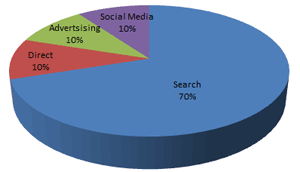 Shayne is reporting this week from Search Marketing Expo in Sydney.
Shayne is reporting this week from Search Marketing Expo in Sydney.
In the first session of SMX Sydney, Rand Fishkin, CEO of SEOmoz told the story of a recent startup that woke up one morning to find their organic search engine traffic from Google had vanished for no obvious reason. Traffic from Google for this particular startup represented the lion’s share of their daily visits, so it had a dramatic, and instant, effect on their bottom line. I’m sure this is an all-too-common story of web sites becoming over dependent upon a single source of traffic.
With Search Engine Marketing, particularly SEO, you can never forget that the engines owe you nothing—they act in the interests of the customer experience (usually the relevance of the results that they deliver), which drives demand, and subsequently their advertising revenue. Granted, all of the big players play well with Search Engine Marketing crowd, but at the end of the day, they only really care about what’s in it for them—not for you …
The key piece of advice here then is to not let your healthy search engine performance today lull you into a false sense of security for tomorrow. If a switch within Google gets flicked, or a lever gets adjusted that influences the search engine algorithm, your search engine performance could change drastically. You need to be able to cope with it.
Rand highlighted the need to stay in touch with best-practice SEO techniques, so you can ensure you’re at the forefront of change. From an SEO perspective this is certainly solid advice, but the advice should not just be applied to search. Relying on any one specific channel for traffic is a big risk to take. Each and every source (direct, referral, advertising, social media etc) has some potential for change, just as search engines do.
A well-planned site will consist of an even mix of traffic sources. The site managers will work at building traffic across all channels, rather than focusing solely on one. This way, if the well was to dry up in one area, plenty of water (traffic) would still flow from other channels.
Take a look at your traffic sources in your current web analytics package and ask yourself: if one of these channels stopped delivering traffic tomorrow, what would it mean to my business? If there’s one channel that dominates all the others, it might be time to look at bringing balance to your incoming traffic sources.


